#Christian Scholars
Explore tagged Tumblr posts
Text
St. Jude
the patron Saint of Lost causes.
Come to my assistance this day and pray for me to the Lord our God in my time of need. I feel hopeless and helpless in my journey, though I know that God is good. I have done all that I could and I pray that it be enough to get by. I don't pray to be the greatest, I pray that I may grow successfully in God's world and God's word. That I may have hope that God's will be my will. St. Jude pray for me.
#prayer#lesbian christian#queer christian#christian#butch lesbian#lesbian catholic#pray with me#faith#Catholics in stem#stem catholics#christian scholars#christian students#prayers for school#physics prayers#prayers for physics#st jude#october
4 notes
·
View notes
Text
Critical analysis of Judaism
Jewish scholars claim that Christian scholars are increasingly monopolizing the research and interpretation of our cultural heritage, and the results bear a purely Christian stamp. Christian scholars often have a peculiar viewpoint that The Talmud spreads hatred and thus cannot be included in the work of the scientific world because it is full of foolish, fantastic tales and…
#African Kush#Anthropomorphism#Asherah#Black people#Blasphemous Assertions#Christian Scholars#Dark Magic#Divine Regret#Dr. Gas Barnea#Ezra#Genocide#Gentile#God has Penis#Hatred#Holocaust#Ignorant God#Islamized Judaism#Jesus return#Judaim#Kabbalah#Mahabharata#Maimonides#Man in God Image#Metaphysical view of God#Mishna Torah#Mohammad in judaism#Moses#Noahide#Oral Talmud#Oral Traditions
0 notes
Note
okay but like. I just had the weirdest thought about that ‘don’t look I’m naked’ comic. Which is that that’s essentially the same thing Adam and Eve did after they ate the fruit of knowledge of good&evil. So I feel like the theological implications of that could kneecap Gabe if he doesn’t think V1 is a being with free will.
yeah ok. i dunno man. is this anything
((side note. this isn’t necessarily meant to be in-character or story-accurate or take place at any particular point in time, just a way to explore some Thoughts. i was also imagining more that V1’s words aren't actually spoken, more like Gabriel’s more articulate interpretation of whatever garbled mechanical noise V1 is using to communicate. I think an angel could do that.))
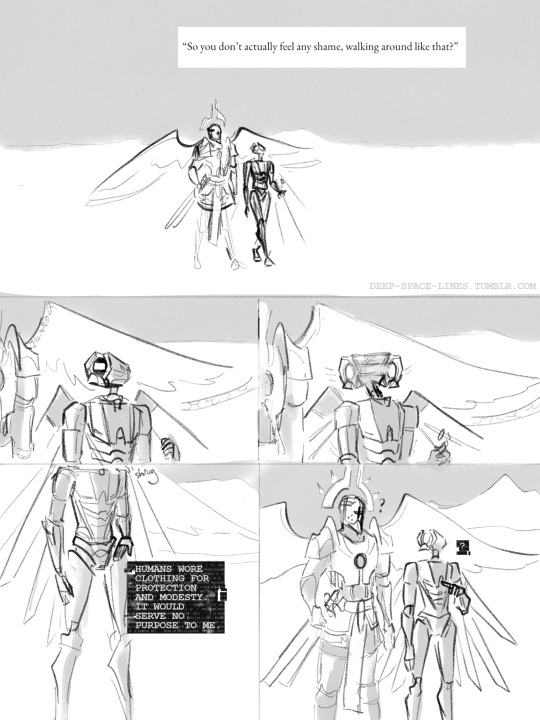

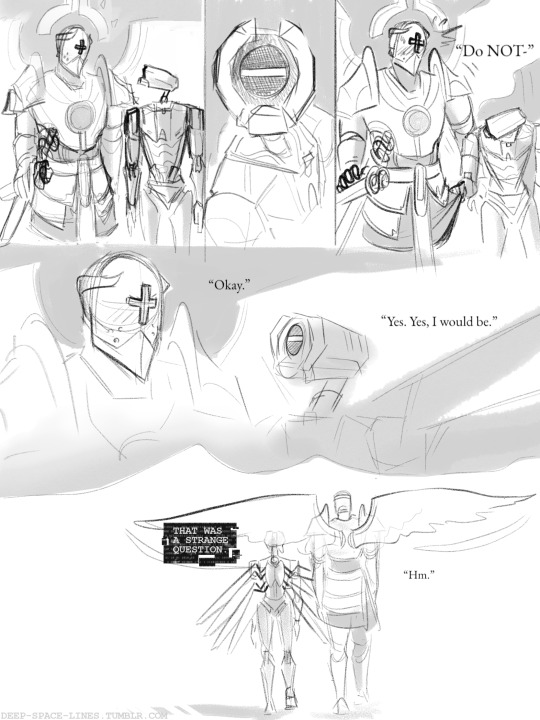
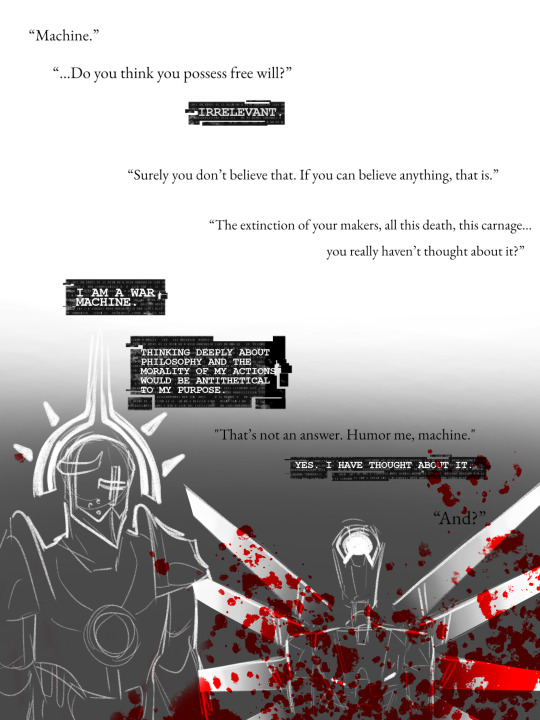
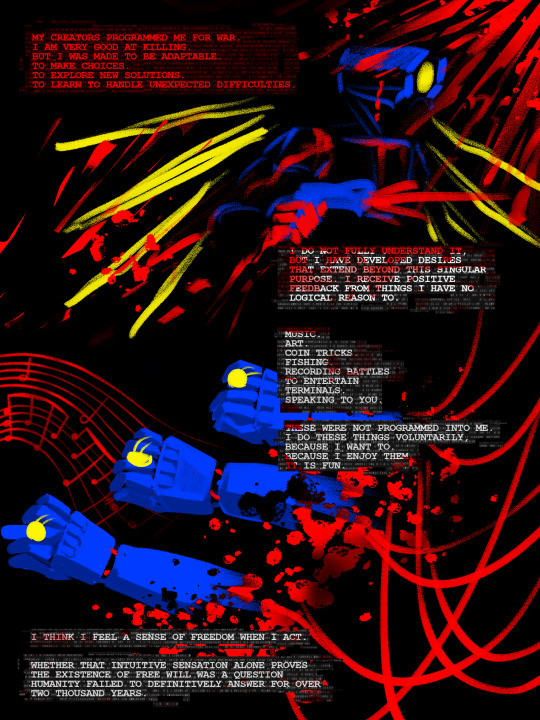
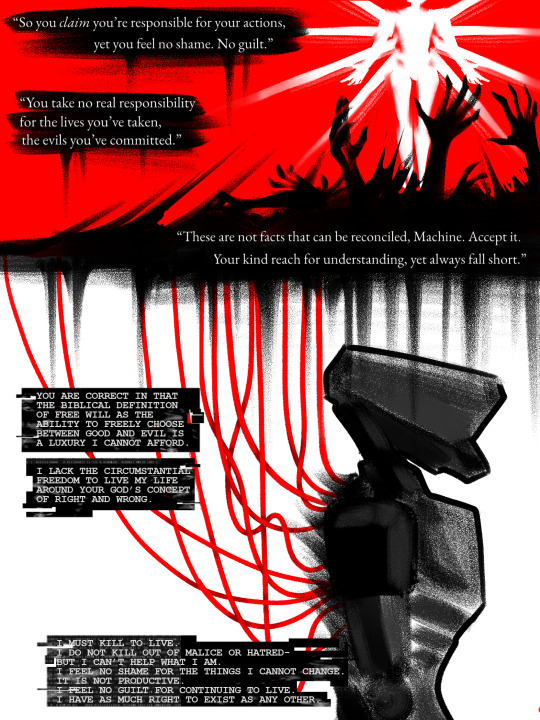
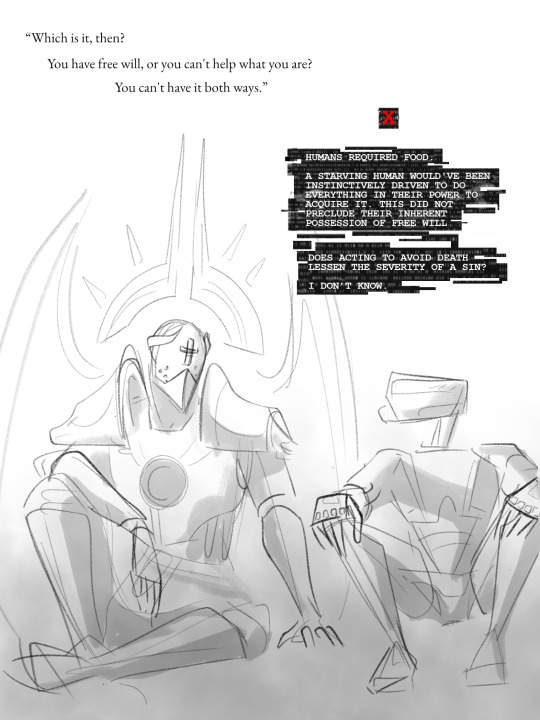
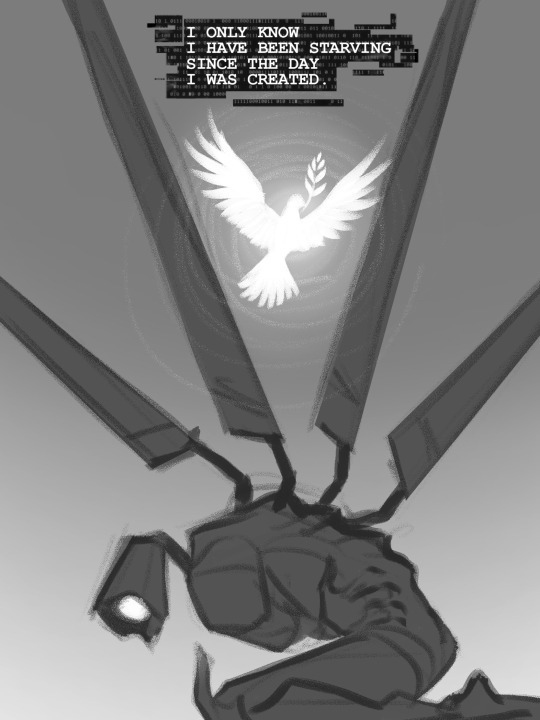

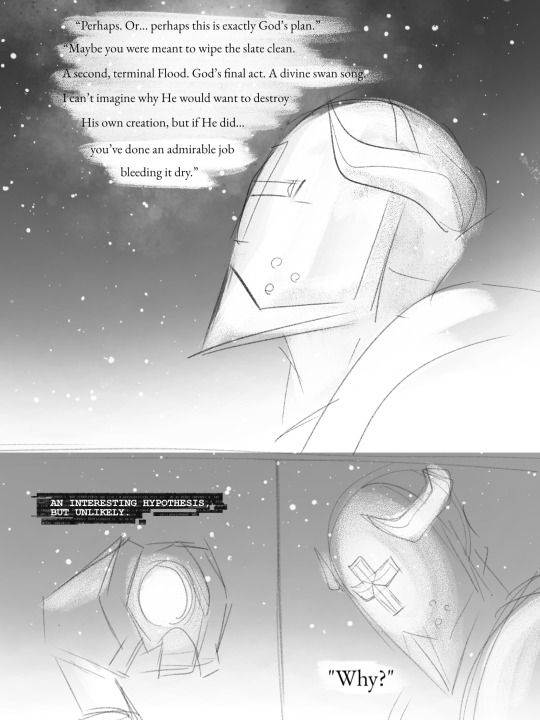

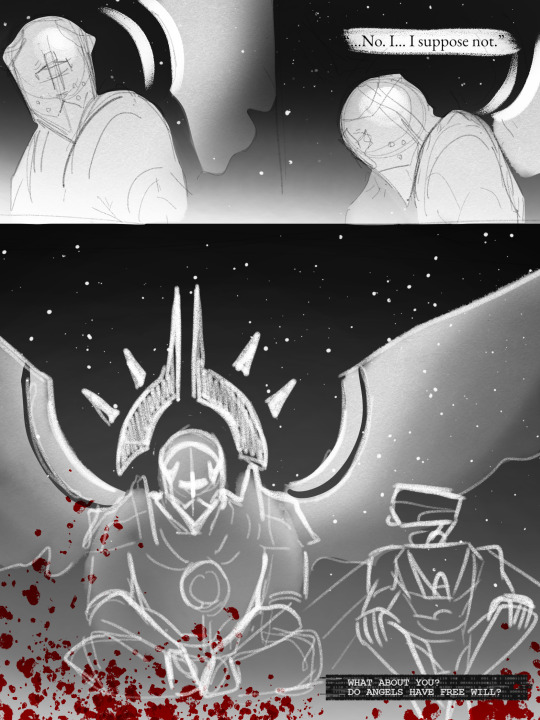
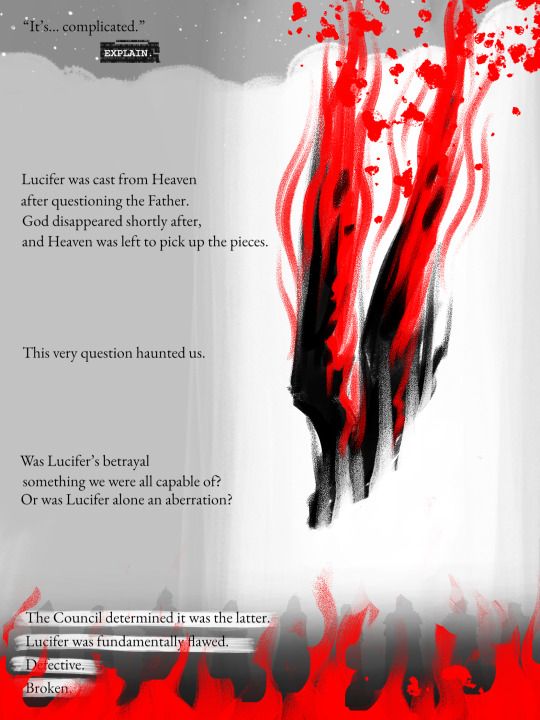
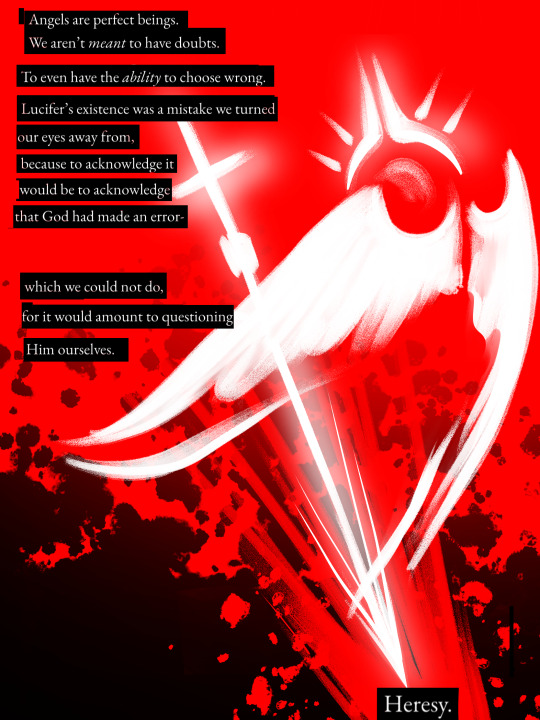
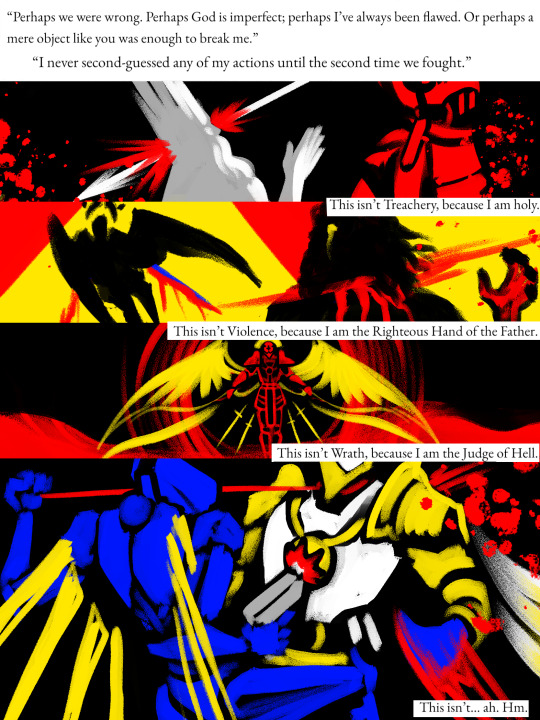
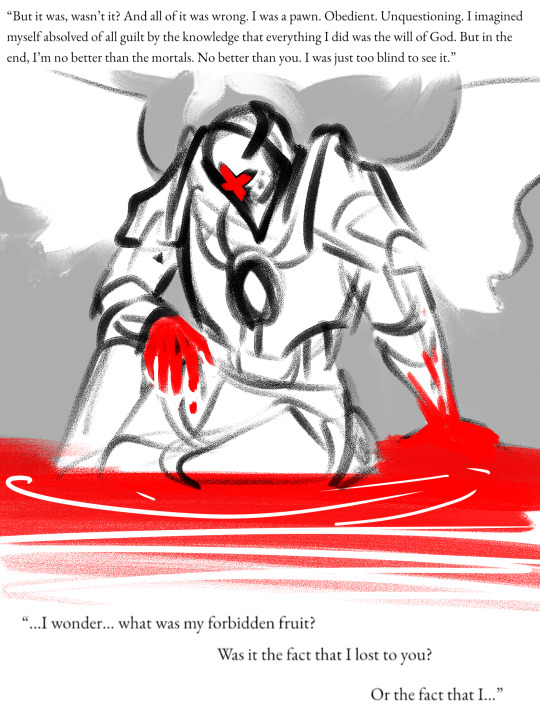
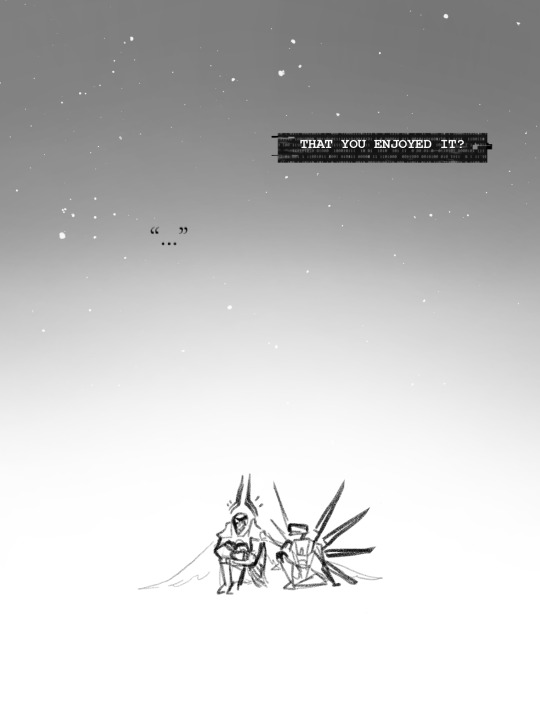


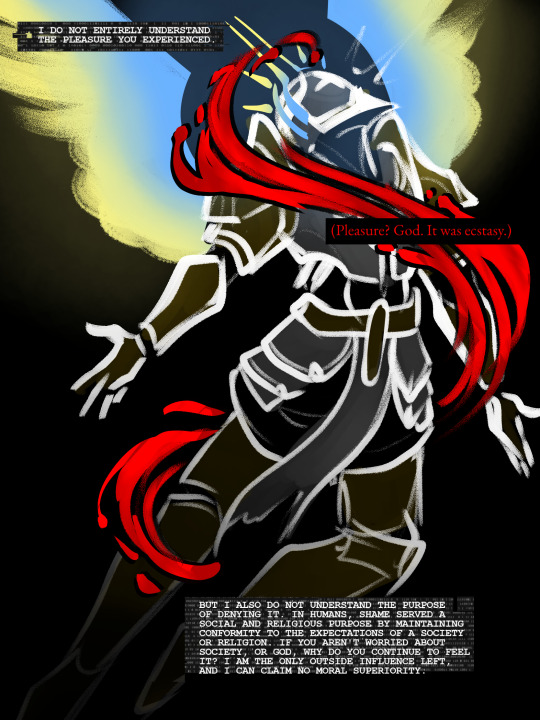
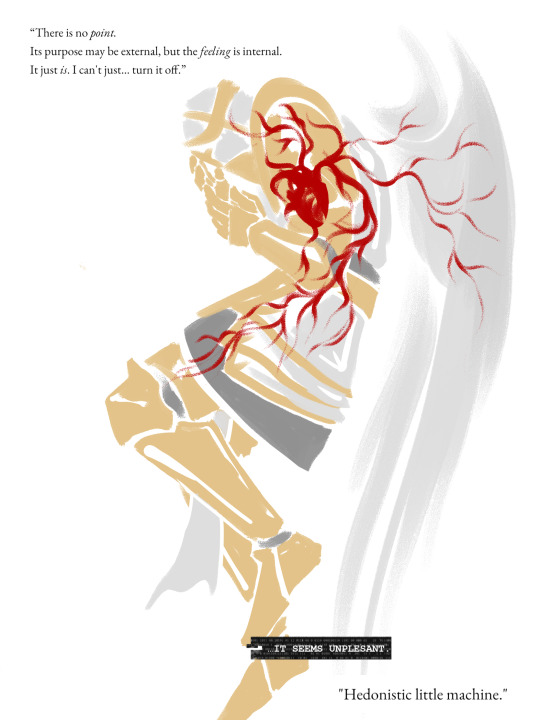

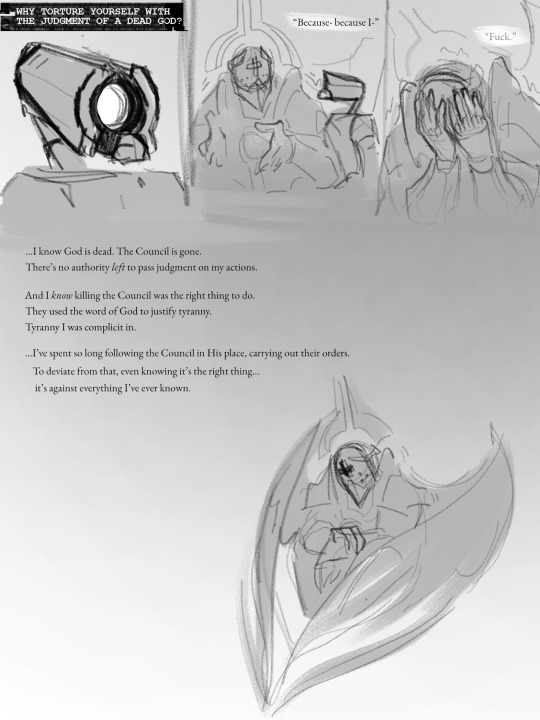


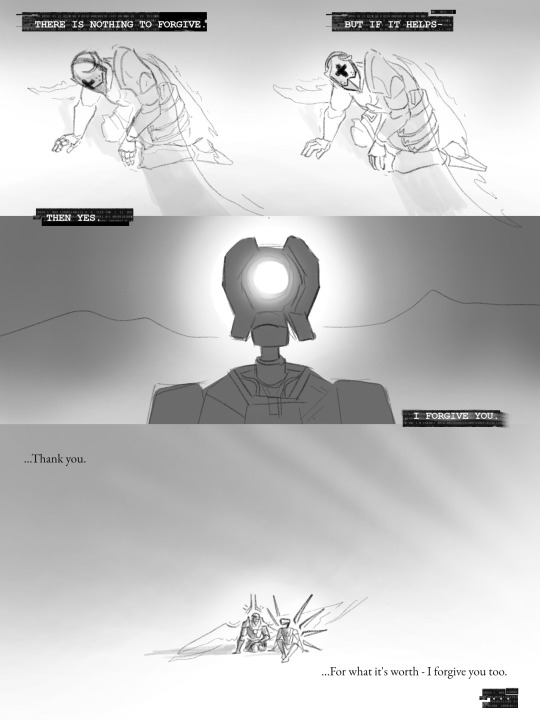


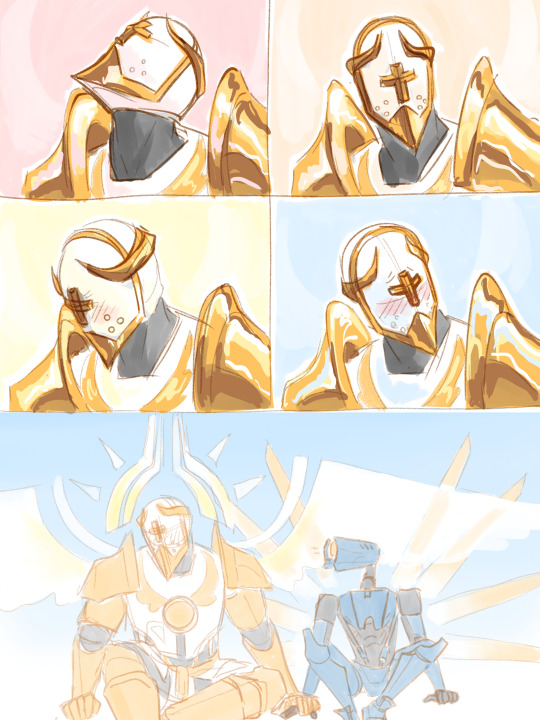

and then they fucked nasty the end
#my art#my writing#who fuckin sent this. fuck you. come off anon so i can kick your ass. (the thoughts this ask sparked consumed almost 3 days of my life)#i dont know what this even is#i just work here#disclaimer i don't come from a particularly religious background so like.#most of my knowledge of christianity comes from when my mom sent me to vbs for cheap babysitting in middle school or absorbed via osmosis#so i have no idea what im talking about except for when i do! hope this helps#i love how i say that like i expect biblical scholars to tear apart my ultrakill gay fanfiction#if you are a biblical scholar and you want to tear apart my ultrakill gay fanfiction please know i am not going to read the bible for this#ultrakill#v1 ultrakill#gabriel ultrakill#gabv1el#blood#love tagging ultrakill stuff with blood. hmm yes the floor here is made out of floor
2K notes
·
View notes
Text

St. Thomas Aquinas, Doctor Angelicus
Dominican friar, philosopher and theologian. To think he was set to become a Benedictine abbot, instead he joined the unlikely poor friars of the Dominicans to become part of the radical mission in preaching the word of Christ.
.
I was not as familiar with this St. Thomas back then, but now knowing a lot more, I'm becoming so fond of him and his life.



#Because of his contribution with his influential writings he became the patron saint of scholars and universities#srsly I love reading about his life#Another most well known Doctor of the Church#St. Thomas Aquinas#Saints#christianity#Catholic Art#my art#my faith#Saint Thomas Aquinas#digital art#would actually like to read some of his works lol
280 notes
·
View notes
Text
for all the shit lewis sometimes gets for his heavy-handed christian allegories, tolkien's work feels more deeply saturated in it tbh... christological themes of course echo throughout but on a more fundamental level, his cosmology (more than lewis's) hinges on racial and spiritual hierarchy. the racial elements are fairly obvious, but even individual races are subject to rigorous ordering: the seemingly arbitrary inequality between valar and maiar; the mightier and fairer high elves who saw the light of aman and the moriquendi who did not; men of darkness, men of the twilight, men of the west of diminished glory who are, or were, higher than the others, stronger and wiser, longer lived, and naturally owed allegiance. better, higher bloodlines: far from social constructs, confirmed by prophecy and magic. all over the place, detailed classifications that prompt questions like "why is it like this? why does it have to be this way?" and for all their equally detailed in-universe justifications, behind it all is the fact that hierarchy is divinely ordained and the unquestionable condition of the world. kind of a bummer honestly
#some disclaimers:#1) though no longer christian i was raised protestant; i may be blind to the more specifically protestant underpinnings of lewis's work#the contrast between them may not be so sharp as this post suggests.#2) these are reflections based on my personal experience of reading and rereading the lord of the rings and the silmarillion in particular#(i am not a tolkien scholar but only an enthusiast of history and of his work)#3) i am uninterested in arguing about the natural goodness or divinity of hierarchy#if you're personally super down with tolkien's cosmology then that's your business. but please leave me alone#lotr#the silmarillion#tolkien#mutterings
20 notes
·
View notes
Text

Philosophy and Christian Art
Artist: Daniel Huntington (American, 1816-1906)
Date: 1868
Medium: Oil on canvas
Collection: Los Angeles County Museum of Art, Los Angeles, CA, United States
Description
Although most of Huntington’s long career was taken up in painting more than one thousand portraits, he also painted landscapes and probably thought of himself as a painter of allegories and ideal subjects. His interest in religious and allegorical painting had been kindled by the Raphaelesque Italian and German ideal subjects he had seen in Rome on his first trip to Europe in 1839. By the 1860s his models were the Venetian artists of the High Renaissance, especially Titian (c. 1488-1576), whose example can be seen in the costumes and figure types depicted in Philosophy and Christian Art. The model or the type of the old man also appears in Huntington’s Sowing the Word, 1868 (New-York Historical Society). The influence of the Venetian school can also be seen in the rounder forms and richer palette of his paintings of this period. Even the half length format seems to echo Venetian examples. The model for the painting to which the young lady gestures, however, appears to be The Adoration of the Shepherds, 1650, by José Ribera (1588-1652) in the Louvre, Paris. The painting is conceived as a conversation between embodiments of opposing, but equally worthy points of view. The wisdom of the aged scholar, reading a book by lamplight, is contrasted with the intuitive perceptions of the young woman who examines a work of art by the daylight signified by the window.
#allegory#painting#oil on canvas#philosophy#christian art#artist#phillsopher#open book#artwork#woman#man#young lady#aged scholar#reading#lamplight#symbolism#window#costume#distant landscape#oil painting#daniel huntington#american painter#american art#19th century painting#los angeles county museum
19 notes
·
View notes
Text
thinking about how ezra pound is responsible for all of this

#dont think i could ever study english again what do you mean they spent 3 weeks teaching us pound and never once brought up the fascism😭#same w not bringing up ginsberg supporting boylove like#idk i think you can mention these things objectively while also teaching students to appreciate the medium and the fact this is just not#done at all is literally killing the culture! its killing the culture#hysterically i have found my theology profs to deal with this issue about ten thousand times more gracefully#like i had one prof who was brought up that one bible scholar from notre dame who got outed for harassing women and was like#he did xyz. his work is important because of xyz. so read his scholarship objectively but remember what he did as a person#when the christians are flexing on you then you have fucked up#also i went to a small liberal arts school in redacted country i have no idea if this is standard practice for english elsewhere tbf#and ofc we were all taught to absolutely hate freud and think none of his work had any contemporary usage
9 notes
·
View notes
Text
On the Higher-Critical Method of Hermeneutics
It is exceedingly trendy to devour religious information of all kinds through the lens of secular scholarship, for either the sake of general knowledge, or for the sake of an artistic adventure. For either of those purposes, and certainly for the purpose of actual religious learning, the higher-critical approach fails on every level. The biggest perpetrators of this online are Genetically Modified Skeptic and Religion for Breakfast; the biggest print perpetrators are Bart D. Ehrman and George Harris. This method fails to accurately describe and convey the concept of religious orthodoxy, and therefore fails to accurately convey controversies within religions; it also fails to anthropologically contend with religions in a way that is honest and charitable; it denies not only the very concept of truth, but also the very concept of literary analysis.

Much of the basis for this argument is rooted in vintage anthropology-- I preface “vintage” because anthropology has changed a great deal in the last 100 (even 50) years, and has come more and more to reflect the higher-critical method of hermeneutics, of course applied to secular cultural artifacts. In the past, anthropologists did not seek to study other cultures as a way to change their own, or as a way to frame their own. They studied it for pure passion. They studied it for themselves. An anthropologist doing similar good work today is Daniel Everett who wrote the sympathetic, raw, and amazing book Don't Sleep, There Are Snakes: Life and Language in the Amazonian Jungle. A main reason why Everett’s work is so effective is because it takes the word of the Pirahã people (the subject of the book) as true. This makes the book strikingly intimate, especially because it is told from Everett’s own perspective. We thus get a greater understanding of the culture-- a highly mysterious and un-understandable culture at that. He writes, “‘I mean, what are you going to do to him for shooting your dog?’ ‘I will do nothing. I won’t hurt my brother. He acted like a child. He did a bad thing. But he is drunk and his head is not working well. He should not have hurt my dog. It is like my child.’ Even when provoked, as Kaaboogí was now, the Pirahãs were able to respond with patience, love, and understanding, in ways rarely matched in any other culture I have encountered.”
A key problem with the higher-critical method is that it applies a hermeneutics of suspicion, rather than a hermeneutics of trust, as vintage anthropology did. The passage above would read much differently, and be much less revelatory, had Everett followed the encounter with an insistence that the Pirahã must not actually be so compassionate, and must, in fact, be putting on a show to fool outsiders for more canoe money. Just as that is unsatisfying, so too is a hermeneutics of suspicion that insists Jesus said to care for the poor in order to manipulate starving Jeudeans into joining his “movement”. Not only is it unsatisfying, but it makes no sense. The higher-critical scholar must invent new motivations seen nowhere else in the text, or in adjoining texts of the day, to justify what is essentially a headcanon. It assumes too much, and what it assumes is an insult: people do not say they believe what they do because they believe it-- they have ulterior motives. The higher-critical method demands you see all people as charlatans.

We should notice that this is an anti-historical method as well. Historians do not make a habit of assuming primary sources are lying unless there is extremely good reason. I’ve studied the writings of Ibn Fadlan on the rituals of the Vikings, and not once did a professor or a critic write that he must’ve been making up the horse-killing for the sake of making barbarians appear worse than Muhammadeans.
The method is also unliterary. It is possible for an atheist to read the Bible (or any scripture, for that matter) and encounter it as a complete work of fiction, whilst still applying the usual rules of textual analysis and letters. It is possible, even in the context of “fiction” for interpretations to be baseless and wrong. We hear in school there is no such thing as a wrong answer in literature, but be assured, there is. There are analysis, conclusions, and summaries that are disconnected from the text so to have nothing backing it up for any kind of merit. For example, if someone were to say, “The theme of Hamlet is that love conquers all,” that would be a conclusion so wrong you’d probably assume the speaker was pretending to have read it. The same is true with the Bible, and with all other scripture. The theme of Maccabees is not that the oppressed should take their torture lying down and there is nothing in the epistles to suggest the Apostle Paul was gay. The latter is fanfiction and the former is active subversion-- look out for that.

You may believe I want only the Bible to be interpreted in such a way. But this would be wrong. I am frequently disgusted by the mistreatment of other sacred texts; in the HCM, this is particularly suffered upon the Quran. My insistence against the HCM is not only religious, but born of an anthropological conviction. I love people; the whole world is my people. I love to study them, to learn about their experiences, and to read what they have written. It breaks something in my heart when even documents I disagree with are encountered as if they are intentionally lying. The Quran was written by a man, and I believe that man believed what he wrote to be true, and I believe that those who believed him really did. I do not like to be taken for a liar, and I assume the feeling is the same through all people.
It weakens the position of the opponents of any text, because in order to argue against something, you must actually know it. You must understand it, and you will never understand something you don’t trust to be the words someone once believed.
#greek orthodox#orthodox christian#russian orthodox#christian blog#catholic#eastern orthodoxy#orthodox christianity#orthodox#christianity#orthodoxy#higher-critical method#hermeneutics#hermeneutics of suspicion#Christianity#christian#christian living#christian broadcasting network#jesus#scripture#christian faith#faith#bible#scripture interpretation#quran#hadith#religion#religions#religious scholars#religious studies#anthropology
9 notes
·
View notes
Text
i am currently reading thomas bradshaw's intimacy for class and i think this may be one of the most insufferable plays i have ever read
#all it is doing so far is going GUESS WHATTTTTT everyone is...A HYPOCRITE!!! this christian? he looks at PORN!!!#this women's studies scholar....is judging WOMEN for their OUTFITS!!!#june.txt#this is that guy who wrote an extremely controversial play about sally hemings and thomas jefferson if any of you remember that
9 notes
·
View notes
Text
i feel like christianity would be such a cooler religion if they hadnt been so so anti-syncretism throughout history. like imagine instead of stomping out paganism they pulled a interpretatio romana. that would've been so cool....
7 notes
·
View notes
Text
Prayer for the Earth science scholar: St. Thomas Aquintis pray with us.
Oh Heavenly Father, creator of Heaven and Earth. As I study the Earth abound with numbers and processes, may you grant me the patience and wisdom to understand what it all means. That my research and my studies may be productive and proactive in the aiding of your people.
For you have created, and I long to understand. Heavenly light, Giver of Wisdom, let a ray of your brilliance shine upon me O'Lord so that I may see the data and be given the gift of knowledge to seek what I must, to make it do good for others; to showcase your benevolence and mightiness.
Grant me a sharp sense of understanding, a retentive memory, and the ability to grasp things correctly. That I may not distort this data and though it may be alarming may I not contribute to panic science. Grant me the talent to speak eloquently about the bigger meaning of this world and how to help others. Allow me to express myself with thoughtfulness of heart. May I be ethical with my findings and deliver the facts with grace and charm as to be heard in earnest and not fear mongering.
I pray for the hearts of the people. Bless their hearts and minds. I pray against their ignorance who rebuke the workings of the world in which you have built in, those who feign ignorance in your name. I pray that their hearts be soften, the minds be open, and their mouths be shut O'Lord. Let not these nay sayers lead others astray from doing what is right, what is just and what is holy.
In the Name of the Lord We pray this in your name Amen
#prayer#prayer for scholars#saint thomas#saint thomas aquinas#catholic#faith#christian faith#Christian scholars#pray with me#christian#episcopal#pray for us
1 note
·
View note
Text
METATRON: or an explanation about why his inclusion in the S2 and S3 narrative is fascinating and weird, actually
Originally, this was going to be a stupid, unlikely, and mildly cynical theory about what I think is going to happen in S3 and how it might compare to my third least favorite TV show finale.
But while I was writing it I went down a Metatron rabbit hole and honestly? It's pretty crazy. Like, really crazy.
Part 1: Metatron
So who is Metatron, anyway?
(This gets a bit detailed but I promise it pays off!)
I think a lot of people, because Metatron is in the book (which is a Book of Revelation parody), assume that he was also a figure in the New Testament- or barring that, in the Old Testament/Hebrew Bible. But he wasn't! In fact, Metatron isn't in Christian scripture or early literature at all.
Metatron is really a (very nearly, he's also mentioned in Islamic texts) Jewish figure. The exact origins are a bit fuzzy to me, as while I'm a scholar of Jewish history this isn't my era (it also gets pretty mystical and my worst grades were on mysticism-related papers), but essentially you're not seeing the name until a century or two after the Common Era at the very least. In antiquity, the name is largely found in the 3rd Book of Enoch (and later other Merkabot/Hekhalot literature) and in the Talmud.
The 3rd Book of Enoch is a work whose origins date back to anywhere from the 1st to the 5th century CE and it continues the themes of the 1st and 2nd books which discuss Enoch, the seventh generation from Adam in the Book of Genesis. In Genesis, Enoch is noted as having been taken by God rather than dying, and the 1st, 2nd, and 3rd Book of Enoch expands on this idea of Enoch being a massively powerful figure in Heaven (keeper of treasures, God's right hand figure, leader of the archangels, etc)- and even potentially being a lesser/dual version of God. In the 3rd book in particular, the word Metatron is used to describe him.
For those who are aware of Jewish theology, it might have occurred to you that the idea of there being a duality of God in any way is a pretty fraught one; Enoch is largely non-canonical in Judaism*, but it was still cited reasonably frequently by Jews in the early Common Era. In the next few centuries, we start to see more mentions of Metatron (at this point, not explicitly identified with Enoch) in Jewish literature, and this becomes a pretty big deal.
We then have three Talmudic mentions of Metatron, and one of them (Avodah Zarah 3b) is relatively minor, but does suggest, importantly, that God deputizes Metatron to do tasks that God would otherwise do. The other two are more interesting here. In Sanhedrin 38b, we see a debate between Rav (Rabbi) Idit and a heretic, who suggests that perhaps Metatron, which Rav Idit has mentioned as a representative of God, should be worshipped on par with God; Rav Idit makes clear that this is not correct.
The most interesting, though, is the story in Chagiga 15a, which tells the story of Rabbi Elisha ben Abuyah, otherwise known as Acher (the Other, signifying that he is a heretic). The story of Acher is a quite famous one, but here it's told with a particular twist that didn't make it into the versions that I learned in Jewish day school- the involvement of Metatron and its influence on the precise nature of Acher's heresy.
Rabbi Elisha ben Abuyah was a 1st century rabbi and teacher who was one of the leaders of his generation who is described as having been one of the four rabbis who entered the "Pardes," or orchard- and he cut down the saplings, becoming a heretic. This is usually interpreted to mean that he was exposed to deep, fundamental understandings of God which caused him to turn away. In this particular version of the story, what he saw was a vision of Heaven in which Metatron was sitting in God's presence. To Elisha ben Abuyah, this was a massive affront to God- surely one should stand in God's presence! This led him to believe that maybe there were two powers in Heaven, and thus led him down the road to heresy and the epithet Acher.
The story continues that as a result, Metatron was beaten with fiery rods to make a statement that he was not parallel to God, contrary to what Acher believed. Metatron was also asked why he hadn't stood up when Acher arrived, to avoid the conclusion. The answer is that the Metatron had permission to sit in order to "write the merits of Israel."
And, because of this heresy by Acher, Metatron is given permission to erase Acher's good deeds. There is a voice from Heaven saying that all sinners may return- except for Acher. This leads to Acher's purposeful slide into heresy more broadly (his first stop is literally to a sex worker, something that would be unacceptable for a rabbi, to PROVE that he's now gone bad).
(Also worth noting- in the Jerusalem Talmud, an entirely different reason is given for Acher's heresy- not that he believed in dualism but that he was angry about unfair human suffering.)
The story of Acher is interesting, in this context, for two reasons:
it's another indication that Jewish tradition is going to absolutely reject any possibility of duality and
it gives a clear indication of what Metatron's power is
So... we know all that. Now what? (You may already have some inkling.)
Part 2: Cosmic Megatron
I've called this section by this name because everything I'm going to say should be foregrounded by my belief that most of this is likely coincidence.
Metatron is a character in the original book of Good Omens, and as far as I can tell is there to fill two functions- to have a heavenly representative and thus avoid having to write dialogue for God, and so that they can have a joke where Pepper confuses him with the Cosmic Megatron, apparently a toy made of plastic, which features laser cannon and can turn into a helicopter.
(He's also called the Metatron- I'm not 100% sure why.)
We know from what Neil Gaiman has been saying that he and Terry Pratchett wrote the book in a pretty casual way. Obviously, the book is written with a certain amount of knowledge about the Bible and Judeo-Christian** religion, which from things that Gaiman has said I think he attributes to their being two bright, well-read men who were educated in a Christian-majority country but which I'm sure also included a decent amount of research- hence the bit in the beginning with different calculations for the year of creation. (Gaiman is of course Jewish but I don't get the impression that he had any formal Jewish education, though I could be wrong.) But it seems to be written largely as satire of some pretty well known Christian concepts, for the most part, though nicely detailed.
That's why my assumption is that Metatron must have been included as an offhand joke, by one of them who had heard of him as a spokesman figure in some other context. Because despite the fact that the Book of Enoch is known within Christianity, that's largely the 1st Book of Enoch, not the 3rd, which is the one where the name Metatron is identified with Enoch. If there are any scholars of Christianity reading this, please correct me if I'm wrong, but- I don't think that Metatron would be a familiar angelic/heavenly figure to the average person given a cursory de facto Christian thinking in purely Christian terms. Therefore, presumably the name was one that either Pratchett or Gaiman had heard in another context and that one of them (possibly Pratchett, as he was apparently the one who mostly wrote the kids) thought would make for an entertaining joke about plastic toys that turn into other plastic toys.
We then know that in a hotel room, after they wrote Good Omens, Pratchett and Gaiman plotted out a potential sequel, tentatively titled 668: Neighbor of the Beast. We know that this was going to feature more of Heaven's side, as Gaiman said in the run up to the expanded S1 (which of course featured the new-to-us characters of Gabriel, Uriel and Michael) that the angel characters were already part of the plan for the sequel. We also know, of course, that S2 is meant as a transition to S3, which is the actual plot to the sequel book.
Obviously, we don't quite know yet what that plot is going to be- but presumably, at some point in it Aziraphale was going to go up to Heaven. But presumably Gabriel, who we can now be quite confident was written out of S3, would have been part of that story in the book! The fact that we AREN'T getting Gabriel in a S3 that's based on a sequel idea that specifically included Gabriel (or so we're told) means that that role must be filled by someone.
It seems very likely that
what would have been Gabriel's role is being filled by Metatron and
Metatron wasn't necessarily supposed to be in the sequel, and thus (in theory) S3, at all.
Now Point 2 is only a guess, and it's entirely possible that it's wrong. But I wonder (and this is a totally separate theory, in some ways) whether the role that Metatron played in S2 is one that would have been played by Gabriel if Jon Hamm had wanted to stay. The casting of Sir Derek Jacobi in S1 was not one that implied to me that this was a character who they had plans for- it was a one-scene role in a show with a decent number of minor cameos for well known actors. His return this season was honestly a pretty big shock to me- and seems to be setting him up as a significant figure in the upcoming season. (Which, incidentally, seems like one that can be pretty easily acted in voiceover/green screen, making it a good role for an actor who may not want a full six episode season of a show.)
So- whether we accept my above hypothesis as true or not- why Metatron?
Part 3: Cosmic Metatron
So mostly these are questions. I obviously don't know the answers any more than anyone else does. I could even be wrong about some of my basic assumptions as far as the timeline.
But regardless, I think that the use of Metatron will be incredibly interesting this season for a few reasons.
First of all, let's discuss the Book of Life. It is, unlike Metatron, actually in the Bible- both Hebrew Bible and Old/New Testament. (In fact, the Book of Life is mentioned in the Book of Revelation- the main source material for the book/S1!) In Judaism, the Book of Life is actually something that is still part of Jewish tradition to this day. On Rosh HaShana, the first day of the year, our prayer for a new year is so that our names can be put in the Book of Life due to our good deeds.
We already know, from Part 1, that Metatron is God's scribe, who writes down people's good deeds- and while the story of Metatron and Acher above is never directly connected to the idea of the Book of Life, the thematic similarities are undeniable and it seems pretty clear that they're talking about the same idea. So we have a potential connection between Metatron as a potential character in Good Omens with the Book of Life as a potential concept in Good Omens- along with the fact that a person can be erased from the Book of Life with eternal ramifications.
It seems pretty clear that, whatever reason Pratchett and Gaiman may have had for including Metatron in the book, he now has a pretty solid reason for being here in the show, based on what we already know.
Also relevant is the status of Metatron. In the 3rd Book of Enoch, we know that he is God's right hand, head of all the archangels, and even is given a title that connotes him as a "lesser God." Which is, as noted, pretty theologically wild for Judaism, and a big reason why Metatron and Enoch don't get a lot of play in contemporary Jewish theology (besides for mysticism). We also know that it's the idea that there can be TWO powers behind the throne that led Acher to be eternally condemned as a heretic.
Someone posted a VERY interesting meta here- I can't find it right this moment- which suggested that God is no longer really around in the world, and that the Job minisode- the final time in the show's chronology when we hear God's voice as anything but narrator- Heaven is bathed in golden light, whereas afterward it has a more sterile and empty white light. I find that to be an fascinating idea- that Metatron is actually serving in some kind of parallel-God role in God's absence.
I'm not going to pretend to know WHY this is. There are lots of interesting potential plot angles- you could have Metatron deposing God, you could have God purposefully withdrawing from humanity/the bureaucracy of religion (maybe something similar to in Pratchett's Monstrous Regiment, which would actually make quite a bit of sense if this was part of the unwritten sequel as he could have recycled the idea), you could have some kind of a power struggle, etc. But it does seem clear- we have Metatron as what is essentially a Godlike figure, with enough power to completely depose Gabriel, shut down the other angels, and elevate Aziraphale (if that's indeed what he does- he is at least able to convince Aziraphale that he has that power, which is something).
We have a Metatron strong enough for someone to, potentially, question whether maybe HE'S the one exercising Godly power. And potentially face the worst of consequences for those questions, consequences that we know Metatron is able to deal out. Consequences which were already threatened in S2.
Now that would certainly fit in VERY well with the kinds of plots we might expect from a Good Omens 3...
It also could lead to a fascinating dynamic if they give Metatron an origin story of being Enoch. Having the big cheese in Heaven be someone who used to be human? That's a fantastic concept, just like how S2 centered a character for whom so much can be explained by the fact that he's a demon who was once an angel.
Basically, I think there is the potential for some interesting stuff here.
Caveat
None of this answers a separate question that I have- why bring in a Jewish angelic figure for a story as intensely Christian as the Second Coming? I have a feeling that the answer is going to be "because it's fun"- regardless of how Metatron is used. That said, if there ends up being a narrative where there's Metatron representing the vengeful God of the Old Testament and Jesus as a nice dude who represents something more forgiving then... Idunno, I'm not gonna be super thrilled.
And also- I'll put it out here now- I didn't love S2. Among other things, I think it was pretty simplistic and I don't think that it developed its ideas to their full potential. I don't know that I trust S3 to be as interested in these details to have ANY of this show up in the plot. It could totally be that Metatron is only there because he's in the book, and the Book of Life is only there because it's in the Book of Revelation. Obviously, I don't know.
But I do think that, whatever Gaiman does write if the show gets renewed, there's a lot of material here for him to work from, if he wants to.
*with the exception of among Ethiopian Jews- in fact, the only extant complete version of the 3rd Book of Enoch is in the Ethiopian religious language Ge'ez
**this is a terrible term and I use it only under protest
#good omens#good omens 2#good omens season 2#good omens spoilers#good omens 2 spoilers#gos2 spoilers#metatron#neil gaiman#terry pratchett#meta#bible#fan theory#actual scholars of christianity please don't hesitate to correct me#actual scholars of ancient judaism also#i'm a modernist lol#good omens meta#go2#good omens 3#good omens 3 speculation
64 notes
·
View notes
Text
youtube
The thread below reminded me of this video, which has all the BibleTubers on YouTube in either a tizzy or a complete lovefest. It's an excellent video for folks who are deconstructing their Christian faith or who want to understand more about history and the Bible.
In it you will find many Biblical scholars speaking confidently about controversial topics, and that's one of the reasons it works. If you already know loads about this subject, you'll be able to spot places where they haven't dug into the nuances. And that's okay. Because the people who don't know the nuances now have a place to start, if they want to go deeper.
Also, I have to admit I love that Satan looks like David Xanatos. Thus I am tagging @taraljc.
10 notes
·
View notes
Text
youtube
Dan’s Sunday school lesson you never heard taught in Sunday school.
#dan mcclellan#scholar of the bible#religion#christianity#genesis#in the beginning#when he began#bible#Youtube
2 notes
·
View notes
Text
I like reading the Bible. Not as a beleiver, I never really have had faith in that sense. But I love reading it, it's such a cool important peace of history that's embedded in so many cultures. And you can see how much media takes inspiration intentionally or not. It's just cool to read.
#🍊.txt#recent fave hobby is seeing different christian scholars and archeologist debate over the topic of caananites snd isrealites#my personal theory is that they are the same based on archeological findings and commonalities in language and gods#well at least from the same group. different subcultures#religious talk#bible is cool
3 notes
·
View notes
Text
Gonna go see St. Thomas Aquinas’ skull this weekend, hopefully. I apologize in advance to what this will do to me as a person
#I’ve only ever called on him once but I’ve never really worked with him#I know technically he was very against witchcraft but as a little scholar I’d like to commune with him a bit#he still might help me get into an mfa#christian witch#christopagan
2 notes
·
View notes